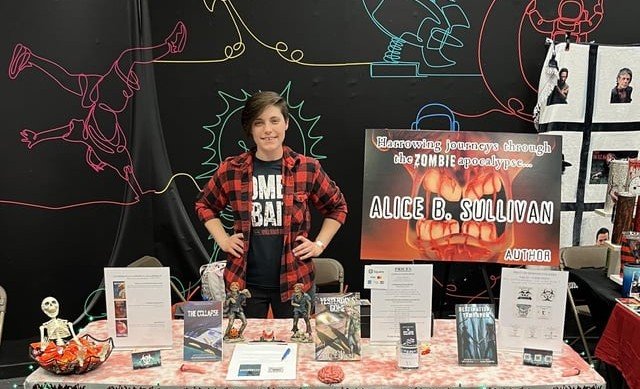DJ Parsons – An Xperience Interview
By Staff on January 7, 2025
DJ Parsons – An Xperience Interview – by Rob Smittix.
RRX: How are you doing today?
DJ: I’m good. How are you?
RRX: Keeping busy, that’s for sure.
DJ: That’s always a good thing.
RRX: Yeah, I thought it would be cool to just chat with you a little bit. Um, so you are a master luthier?
DJ: I am.
RRX: I don’t know if I pronounced that right. Hopefully – I went to Albany High so I pronounce things wrong.
DJ: I’ve had people ask me if it’s a new religion and I say, no, it’s not Lutheran, it’s luthier.
RRX: That’s funny. Tell us a little bit about what you do, how you got started, and the services that you offer.
DJ: Well, I went to Galloup School of Lutherie in Michigan. I came out of there in like ’08, and I started my guitar tech business in Boston. It was a very successful shop, and one day, one of my customers came to me and said, “You really should teach people to do what you do.” The main reason that I started the school was that there was a lot of work going on out there that was not very good. So, I wanted to teach people to do the work the way that I do it, the right way.
I’d been running the school for like 15 years and had a very successful school in Massachusetts. It pretty much got shut down during the pandemic. My wife and I were living in Massachusetts, and we have two sons who live in this area, one in Niskayuna and one in Glenville. We said, if we don’t move out there, we’re never gonna see anybody. So we came out here, and now we have four grandchildren, and it’s really been great. I didn’t know if I could reboot the school in this area or not. The first place I looked at was in the Frog Island Schoolhouse. I figured, what better place for a school than a schoolhouse? It’s worked out very well. I’ve been doing it for three or four years in that location. Overall, I’ve graduated probably 70 or 80 students. Now there are 70 to 80 luthier guitar techs out there that weren’t there before that I trained. And that’s my mission. You know? I’m 71 this year, and my mission is to put as many good luthiers out on the market as I can.
RRX: Oh, absolutely. I know just from being in the music scene and being in a band myself … I know a lot of guitarists who don’t know how to do their own setups, and they always depend on other people to do it.
DJ: And again, the reason I started the school was most guitar players spend their whole life looking for a decent setup. When a person brings a guitar to me to be set up, I have them play it for me. The way they play informs the way to do a setup. Unfortunately, most guitar techs set up guitars the way that they play, and that’s not good. What good is that?
RRX: Correct. That makes sense because everyone has their own signature sound, their own signature style. It’s just like when people try to backline amplifiers at a show; you’re not gonna get the sound that you’re looking for from somebody else’s amp.
DJ: Right.
RRX: That’s something that I know you are very adamant about is getting people set up on the sound that they want. Set up the way that they want it, not the other guy.
DJ: That’s right. My students have been a mixture of people that wanna do this part-time or full-time themselves. Probably a third of the people that I train just wanna do their own setup. My standard course, the students come once a week for an hour. It takes about six months to train them to where I give them a certificate as a luthier.
But what’s taken on a lot of speed in the last couple of years is people coming in from out of state. People come in to take my course from all over the place. When they do that, I do a two-week accelerated course where they come and meet with me two hours a day for two weeks. I mean, it’s like a fire hose, but it works out well because there are very few people in the country that do what I do.
RRX: Yeah, that’s awesome. So – people who are traveling in – obviously, their time is limited, so you accelerate the program, and you’re squeezing in a bunch of knowledge into a very short period of time.
DJ: Yeah. And there’s a pretty good network of Airbnbs in the area. So they tend to stay there. Now, on that training, the weeks don’t need to be consecutive. I had a guy come in May, and then he came back in August to finish it up. In fact, I prefer that. I mean … if we go back-to-back, it’s just a lot of work for me, you know?
RRX: No, it makes sense.
DJ: As I say, it’s constant, it’s nonstop. Typically, I have about a dozen students at a time. I like to keep it at about that number because then I can be flexible. As I say, my students come for an hour a week, but it’s not always the same day, and it’s not always the same hour. They have that flexibility to mix it up a little bit. I teach seven days a week, usually until about noon or one o’clock, and then the rest of the time it’s with the grandchildren. So that’s what I do
RRX: How young should a guitarist start learning how to do their own setup?
DJ: I’m about to take on my youngest student ever at 13 years old. I’m also now teaching only my second woman student ever. Which just seems kind of weird to me. It just seems to me that women are more detail-oriented than guys are, but I guess I have to admit that it’s a male-dominated discipline.
RRX: Well – for all of the women guitarists reading this – definitely hit DJ up!
DJ: The thing I wanna emphasize about the school, though, is it’s a lot of fun. I still do repairs on guitars. And one of the cool things about having people learn from me is that I’ve got a very structured way of teaching. It took me a long time to put the curriculum together, and it’s a progressive thing. But every once in a while, something cool will come through the shop, and we’ll do what I call a sidetrack, ie: a broken neck, lifting, bridge, that type of thing, and they’re able to see that. I mean, your value as a guitar tech or a luthier has a lot to do with what you’ve been exposed to. And probably the number one thing about that discipline is troubleshooting. If somebody walks in the door, they’ve got a situation. You basically just say to them, “I’m on it,” and you take care of it. If it’s nothing you’ve seen before, you pick up the phone and call DJ and say, “DJ, what am I gonna do? I haven’t seen this before.” So my graduates are calling me all the time.
RRX: That’s awesome. I have two guitarists in my band, and my one guitarist literally only owns one guitar. It’s an amazing Les Paul from the ‘70s, but I’ve seen it when his headstock broke off, and he had to send it out to get repaired. My other guitarist, on the other hand, had nearly 70 guitars at one point.
DJ: Oh my God. You know, the old T-shirt? You can never have too many guitars.
RRX: Yeah, exactly, but I mean … when you are a guy that only has that one guitar, I think it’s really important to be able to adapt these skills. And then, if you’re on the flip side of that, and you have a whole bunch of guitars … I imagine each guitar might have a different kind of setup because that’s the reason you have different guitars for different sounds.
DJ: Yes, they all do.
RRX: I think you’re providing a great service. Like you said, it’s a rare service. Not a lot of people are doing this, but the more you get in there, the more they will.
DJ: The Guitar Center in Albany reached out to me a couple of years ago and had me train a couple of their people to work in their stores. A couple of the guys that I’ve graduated have gone on to be the lead guitar techs for Guitar Center. So, that’s kind of gratifying.
RRX: Absolutely. Is there anything that you would wanna stress to people out there if they have someone in their family that plays guitar or they play guitar themselves … what would you say to encourage them to come on in and see what you’re all about?
DJ: It’s probably one of the coolest things you could ever wanna do. As a guitarist, I’m sure you know it. One of the guys that I’ve known for a long time is the roadie for the Rolling Stones for God’s sake.
RRX: Wow.
DJ: Yeah. I mean … there’s nothing cooler that you could ever want to do, and it’s a great way to change careers if that’s what you’re looking to do.
You could work in your home, you control how you meet with the public, and there’s no better way to make a living. And you can make a living doing this. You gotta put the work in, and you gotta be well-trained but you can do it! So I would say, just give a call, drop a line, and we can discuss the school.
Parsons Guitar Repair School
www.parsonsguitarrepairschool.com
pgrschool41@gmail.com
(518) 704-5208
Frog Island Schoolhouse
66 East St., Unit D
Mechanicville, NY 12118





 RadioRadioX
RadioRadioX